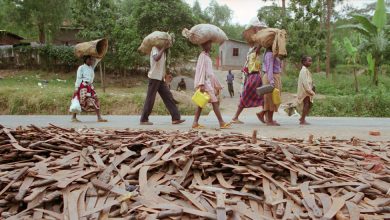How to Celebrate Pandemic Thanksgiving, Round 2

This article is part of the Debatable newsletter. You can sign up here to receive it on Tuesdays and Thursdays.
After a sharp decline in holiday travel last year, Americans are back in a festive mood, with airline traffic this Thanksgiving season expected to rebound to prepandemic levels. For countless people, this week will be the first time they gather with family in two years.
For that reason alone, this holiday season was never going to be “normal,” exactly. And not unlike this time last year, coronavirus infections are spiking once again. So how should Americans navigate this second pandemic Thanksgiving? Here’s what people are saying.
How to have a safe — or safer — Thanksgiving
As Jennifer Nuzzo, an epidemiologist at the Johns Hopkins Bloomberg School of Public Health, told The Times, public health experts tend to avoid the word “safe” because safety is relative: Some things are safer than others, but nothing is zero risk.
Of course, the biggest difference between this Thanksgiving and last is the widespread availability of vaccines that greatly reduce Covid’s risk. That’s prompted many families to make vaccination a prerequisite for an invitation.
“I really do think that it’s perfectly acceptable to say, ‘I’m sorry you’re not vaccinated. You know, Grandma’s here, and by you coming, that increases her risk substantially,’” William Miller, an epidemiologist at The Ohio State University, told NPR.
But gathering with unvaccinated guests, while less safe, isn’t necessarily unreasonable. “In navigating risks, so much of what is involved is personal risk tolerance and judgments about benefits,” Nuzzo said. “Though I’m generally more comfortable in social gatherings where the adults are vaccinated, if the event were important to me, I may be willing to assume some additional risk from being around unvaccinated people.”
To mitigate that risk, Nuzzo and other experts recommend that everyone in your party take a rapid test on the day of the gathering. Even if every invitee is vaccinated, rapid testing can provide an additional layer of protection.
“Breakthrough infections and Covid spread can occur, and rapid tests can help catch anyone who might be infectious, thus minimizing the chance of transmission at the event,” said Linsey Marr, an engineering professor at Virginia Tech, where she studies airborne transmission of viruses. “You can further reduce the risk by improving ventilation and/or air filtration.”
Rapid tests can also ease safety concerns for people who are especially vulnerable to Covid, like the elderly and the immunocompromised. “For the oldest age groups, Covid presents a real risk even after vaccination,” The Times’s David Leonhardt writes. “As a result, older Americans need protection during a surge.”
[“Why even fully vaccinated older people are at high risk for severe Covid-19”]
Rapid testing is also a good way to protect children under 5, who are too young to get vaccinated, though the risk Covid poses to them is in general relatively small. “There’s still a lot of virus in the community, but the truth of the matter is, little kids are not exceedingly susceptible to disease with this virus,” said Michael Mina, an immunologist at the Harvard T.H. Chan School of Public Health.
How to keep the peace
Over the years, Thanksgiving has garnered a reputation for being a crucible of family conflict, particularly of the political kind. But as my colleague Giovanni Russonello wrote last year, this cliché is more myth than reality: For most Americans, political debate rarely makes an appearance at the table, and not every family is allergic to it.
It’s true, though, that the pandemic has created new sources of potential familial friction. Insofar as Covid vaccination is politicized, some political discussion may be inevitable. “Now it’s no longer whether you just disagree about the long-term effects of climate change,” said Jill Suitor, a sociologist at Purdue University, “but whether you believe that having certain family members present poses a serious danger to other family members.”
In the view of Abdullah Shihipar, a public health research associate at Brown University, trying to completely avoid arguments about Covid safety can be foolish. “I’d rather have a conflict with a relative now and reconcile it later than have someone die,” he said.
But it’s still possible to navigate these conflicts gracefully, Emily Esfahani Smith, a doctoral student in clinical psychology, argues in The Times. After you have the vaccine conversation, banish politics from the table if you know it could lead to a blowup. And perhaps even more effective than avoiding politics, she says, is extending grace to one another.
“This means assuming good faith, despite how annoying or passive-aggressive family members are acting,” she writes. “Though the pandemic has increased tensions within families, it has also created an opening. Now more than ever, people are recognizing the importance of being together — and how precious and fleeting life can be.”
If you anticipate unavoidable, intolerable conflict — or if you’re simply not feeling up to the occasion — skipping Thanksgiving is also an option. “Things are still shaken up, and a lot of us (me, for instance) still feel fragile,” Elazar Sontag writes in Eater. “This could, then, be the perfect year to politely decline the invitations, rain check the family reunions, and do something for ourselves. Why not take a trip?”
Depending on whose invitation you’re declining, though, it may not be a decision to take lightly. “Understand that not showing up is likely to have consequences for your relationships,” says Peter T. Coleman, a professor of psychology and education at Columbia. “If you decide to stay away, I would recommend informing people beforehand in as clear and respectful a way as possible.”
How to feast in the time of coronavirus
As the Times Food columnist Melissa Clark wrote last year, perhaps a little mournfully, “The whole point of Thanksgiving is to go big: a huge turkey surrounded by a bevy of sides and what’s never too many pies, all devoured by relatives who may or may not be under the influence of free-flowing wine.”
That this cornucopian fantasy was out of reach for so many last November is, for some menu planners, all the more reason to recommit now to the bit, to cook, as The Times’s Sam Sifton is planning, “with abandon and joy.”
But just as last year, there are also good reasons to simplify. For one thing, because of a mix of supply-chain problems, high transportation expenses, labor shortages and trade policies, this year’s could be the most expensive Thanksgiving meal in the history of the holiday, The Times’s Kim Severson reports.
And that’s just accounting for the food. If you plan to use rapid tests, be aware that unlike in many other countries, they are scarce and expensive in the United States, costing around $12 or more apiece. “This year, tests, not turkeys, might turn out to be the most expensive, prep-heavy fixtures of many a Thanksgiving table,” Katherine J. Wu writes in The Atlantic.
The expense is perhaps “just another reason to try and get invited to someone else’s house so your only responsibility is to bring some bottles of wine and maybe a pie,” Alan Sytsma writes at Grub Street. “You could also outsource the cooking and order from a restaurant, but that feels like cheating, somehow. And yet, nobody will be upset if they see one of those Popeyes Cajun turkeys on the table.”
If you don’t want to outsource your meal, there are still other ways to lighten the workload. My colleague Eric Kim has created a scaled-down menu for precisely that purpose, with a turkey breast instead of a whole bird at its center. Most of the dishes can be prepared with little more than a sheet pan and a large skillet, and everything cooks at 350 degrees.
You could also forgo the turkey entirely: A filet (or two or three) of salmon is much quicker to prepare, while a fully vegetarian menu tends to be easier on the wallet.
Clark, for her part, believes the best way to mix up Thanksgiving this year is to focus on the side dishes, “the heroes of the holiday table.” Her top three recipes at the moment are a cheesy potato gratin, roasted carrots and squash pizza. As she told Bloomberg, “Everyone will remember the Thanksgiving they got to have pizza.”
Do you have a point of view we missed? Email us at [email protected]. Please note your name, age and location in your response, which may be included in the next newsletter.
READ MORE
“Quiz: Hosting Thanksgiving? Here’s How to Make It Safer” [The New York Times]
“How to Make Your Thanksgiving Dinner Less Boring” [The New York Times]
“Best Vegetarian Thanksgiving Side Dishes” [The New York Times]
“For Those Who Feel Rejected by Family, Friendsgiving Can Be a Lifeline” [The New York Times]
WHAT YOU’RE SAYING
Here’s what a reader had to say about last Tuesday’s debate: When can the U.S. declare victory over Covid?
Timothy Carey, director of the Institute of Global Health Equity Research at the University of Global Health Equity in Rwanda: “The point is, it’s a global pandemic. Authorities such as the W.H.O. and Unicef are unequivocal that none of us will be safe while large numbers of the global community remain unvaccinated. In the U.S.’s neighborhood, for example, although the U.S. has a total vaccination rate per 100 people of 131.42, Haiti’s rate is 1.2.
“This is not a time for league-ladder politics. It doesn’t matter which countries are the first to have the majority of their populations vaccinated. It matters which countries are the last to have their populations vaccinated. The closer the last can be to the first, the safer we all will be.”





